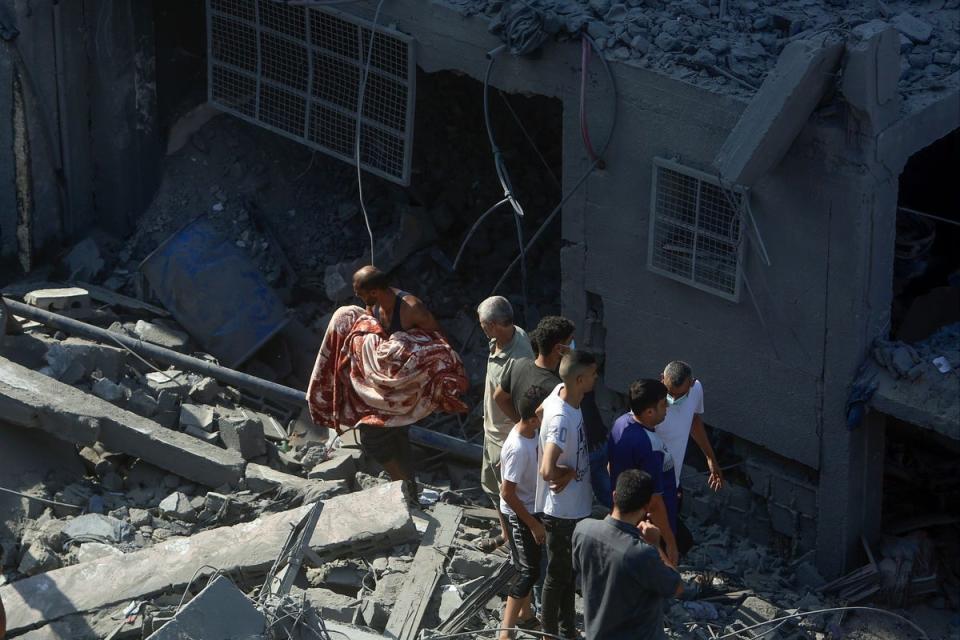Israeli forces push into Gaza City amid fierce fighting
Israeli[1] forces have pushed into Gaza City but are facing hit-and-run attacks from militants in its tunnel complex, according to Prime Minister Benjamin Netanyahu. The Palestinian death toll from nearly four weeks of Israeli air and artillery strikes on the blockaded enclave meanwhile rose past 9,000 on Thursday, Gaza health authorities said. The Gaza Strip's main population centre in the north has become the focus of attack for Israel, which has vowed to annihilate the Islamist group's command structure and has told civilians to flee to the south.
"We're at the height of the battle. We've had impressive successes and have passed the outskirts of Gaza City. We are advancing," Netanyahu said in a statement.
He gave no further details. Israeli military chief Lieutenant-General Herzi Halevi said in a televised statement: "Our forces are now in the heart of a ground operation in the northern Gaza Strip.""Our soldiers completed the encirclement of Gaza City, the focus of the terrorist organisation Hamas," said Rear Admiral Daniel Hagari, spokesman for the Israel Defense Forces. "In the last few hours, armoured troops, infantry and (air force) attacked the placements, launch positions, headquarters and additional terror infrastructures that serve the leadership of Hamas and its terrorists."Brigadier General Iddo Mizrahi, chief of Israel's military engineers, said troops were in a first stage of opening access routes in Gaza but were encountering mines and booby-traps. "Hamas has learned and prepared itself well," he said.
Israeli troops have faced resistance from Hamas and allied Islamic Jihad fighters who have been seen emerging from tunnels to fire at tanks, then disappearing back into the underground network. "They never stopped bombing Gaza City all night, the house never stopped shaking," said one Palestinian man, asking not to be identified by name. Story continues
"But in the morning we discover the Israeli forces are still outside the city, in the outskirts and that means the resistance is heavier than they expected."


Palestinians carry a body found under the rubble of a destroyed building following an Israeli airstrike in Bureij refugee camp, Gaza Strip (AP) Aware of the difficulties of fighting in an urban environment, Israeli officers' strategy appears for now to be concentrating large forces in the northern Gaza Strip rather than launching a ground assault on the entire territory. As international [2]calls for a humanitarian pause in hostilities[3] go unheeded, Palestinians are suffering shortages of food, fuel, drinking water and medicine.
Sewage is leaking, some are drinking salt water and the trickle of aid permitted in by Israel is a tiny proportion of what is needed. Over a third of Gaza's 35 hospitals are not functioning, with many turned into impromptu refugee camps and some rescuers using donkey carts instead of ambulances. "The situation is beyond catastrophic in the hospitals," said the charity Medical Aid for Palestinians, describing packed corridors and many medics themselves bereaved and homeless.
The head of Israel's armed forces signalled willingness on Thursday to ease its embargo on fuel for Gaza, saying that if hospitals run out they could be resupplied under supervision. The latest war in the decades-old conflict began when Hamas fighters broke through the border on October 7. Israel says they killed 1,400 people, mostly civilians, and took more than 200 hostages in the deadliest day of its 75-year history.
Israel's ensuing bombardment of the small Palestinian enclave of 2.3 million people has killed at least 9,061 people, including 3,760 children and 2,326 women, according to Gaza health authorities. After a total blockade of Gaza for more than three weeks, foreign passport-holders and some wounded were allowed out. Palestinian border official Wael Abu Mehsen said 400 foreign citizens would leave for Egypt via the Rafah crossing on Thursday, after some 320 on Wednesday.
Dozens of critically injured Palestinians were to cross too. Israel asked foreign countries to send hospital ships for them. Violence has also spread to the occupied West Bank[4], with Israeli raids touching off clashes with gunmen and people throwing stones.
Palestinian medics said three teenagers and a 25-year-old were killed there in clashes on Thursday.
Israel's army had no comment.
Separately, the military and medics said Palestinian gunmen killed an Israeli motorist in the West Bank.
References
- ^ Israeli (www.standard.co.uk)
- ^ international (www.standard.co.uk)
- ^ humanitarian pause in hostilities (www.standard.co.uk)
- ^ West Bank (www.standard.co.uk)